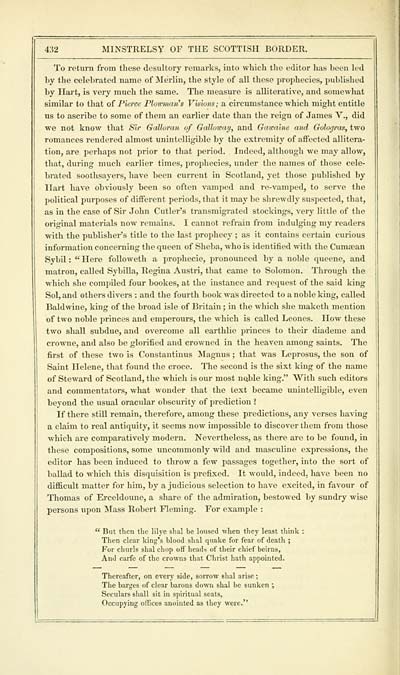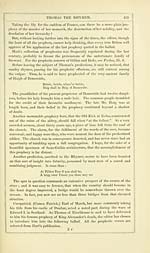Download files
Complete book:
Individual page:
Thumbnail gallery: Grid view | List view

432 MINSTRELSY OF THE SCOTTISH BORDER.
To return from these desultory remarks, into which tlie editor has been led
l)y the celebrated name of Merlin, the style of all these prophecies, published
by Hart, is very much the same. The measure is alliterative, and somewhat
similar to that of Pierce Plomnati's Visions; a circumstance which might entitle
us to ascribe to some of them an earlier date than the reign of James V., did
we not know that Sir Galloran of Galloway, and Gawalne and Gologras, two
romances rendered almost unintelligible by the extremity of affected allitera-
tion, are perhaps not prior to that period. Indeed, although we may allow,
that, during much earlier times, prophecies, imder the names of those cele-
brated soothsayers, have been current in Scotland, yet those published by
Hart have obviously been so often vamjied and re-vamped, to serve the
political purposes of different periods, that it may be shrewdly suspected, that,
as in the case of Sir John Cutler's transmigi-ated stockings, very little of the
original materials now remains. I cannot refrain from indulging my readers
with the publisher's title to the last j^rophecy ; as it contains certain curious
information concerning the queen of Sheba, who is identified with the Cumtean
Sybil : " Here followeth a prophecie, pronounced by a noble queene, and
matron, called Sybilla, Regina Austri, that came to Solomon. Through the
which she compiled four bookes, at the instance and request of the said king
Sol, and others divers : and the fourth book was directed to a noble king, called
Baldwine, king of the broad isle of Britain ; in the which she maketh mention
of two noble princes and emperours, the which is called Leones. How these
two shall subdue, and overcome all earthlie princes to their diademe and
crowne, and also be glorified and crowned in the heaven among saints. The
first of these two is Constantinus Magnus ; that was Leprosus, the son of
Saint Ilolene, that found the croce. The second is the sixt king of the name
of Steward of Scotland, the which is our most nable king." With such editors
and commentators, what wonder that the text became unintelligible, even
beyond the usual oracular obscurity of prediction ?
If there still remain, therefore, among these predictions, any verses having
a claim to real antiquity, it seems now impossible to discover them from those
which are comparatively modern. Nevertheless, as there are to be found, in
these compositions, some uncommonly wild and masculine expressions, the
editor has been induced to throw a few passages together, into the sort of
ballad to which this disquisition is prefixed. It would, indeed, have been no
difficult matter for him, by a judicious selection to have excited, in favour of
Thomas of Erceldoune, a share of the admiration, bestowed by sundry wise
persons upon Mass Robert Fleming. For example :
" But then the lilye shal be loused when they least think :
Then clear king's blood shal quake for feai- of death ;
For churls shal chop otf heads of their chief beirns,
And carfe of the crowns that Christ hath appointed.
Thereafter, on every side, sorrow shal arise ;
The barges of clear barons down shal be sunken
Seculars shall sit in spiritual seats.
Occupying offices anointed as they were."
To return from these desultory remarks, into which tlie editor has been led
l)y the celebrated name of Merlin, the style of all these prophecies, published
by Hart, is very much the same. The measure is alliterative, and somewhat
similar to that of Pierce Plomnati's Visions; a circumstance which might entitle
us to ascribe to some of them an earlier date than the reign of James V., did
we not know that Sir Galloran of Galloway, and Gawalne and Gologras, two
romances rendered almost unintelligible by the extremity of affected allitera-
tion, are perhaps not prior to that period. Indeed, although we may allow,
that, during much earlier times, prophecies, imder the names of those cele-
brated soothsayers, have been current in Scotland, yet those published by
Hart have obviously been so often vamjied and re-vamped, to serve the
political purposes of different periods, that it may be shrewdly suspected, that,
as in the case of Sir John Cutler's transmigi-ated stockings, very little of the
original materials now remains. I cannot refrain from indulging my readers
with the publisher's title to the last j^rophecy ; as it contains certain curious
information concerning the queen of Sheba, who is identified with the Cumtean
Sybil : " Here followeth a prophecie, pronounced by a noble queene, and
matron, called Sybilla, Regina Austri, that came to Solomon. Through the
which she compiled four bookes, at the instance and request of the said king
Sol, and others divers : and the fourth book was directed to a noble king, called
Baldwine, king of the broad isle of Britain ; in the which she maketh mention
of two noble princes and emperours, the which is called Leones. How these
two shall subdue, and overcome all earthlie princes to their diademe and
crowne, and also be glorified and crowned in the heaven among saints. The
first of these two is Constantinus Magnus ; that was Leprosus, the son of
Saint Ilolene, that found the croce. The second is the sixt king of the name
of Steward of Scotland, the which is our most nable king." With such editors
and commentators, what wonder that the text became unintelligible, even
beyond the usual oracular obscurity of prediction ?
If there still remain, therefore, among these predictions, any verses having
a claim to real antiquity, it seems now impossible to discover them from those
which are comparatively modern. Nevertheless, as there are to be found, in
these compositions, some uncommonly wild and masculine expressions, the
editor has been induced to throw a few passages together, into the sort of
ballad to which this disquisition is prefixed. It would, indeed, have been no
difficult matter for him, by a judicious selection to have excited, in favour of
Thomas of Erceldoune, a share of the admiration, bestowed by sundry wise
persons upon Mass Robert Fleming. For example :
" But then the lilye shal be loused when they least think :
Then clear king's blood shal quake for feai- of death ;
For churls shal chop otf heads of their chief beirns,
And carfe of the crowns that Christ hath appointed.
Thereafter, on every side, sorrow shal arise ;
The barges of clear barons down shal be sunken
Seculars shall sit in spiritual seats.
Occupying offices anointed as they were."
Set display mode to: Large image | Transcription
Images and transcriptions on this page, including medium image downloads, may be used under the Creative Commons Attribution 4.0 International Licence unless otherwise stated. ![]()
| Early Gaelic Book Collections > J. F. Campbell Collection > Minstrelsy of the Scottish border > (526) |
|---|
| Permanent URL | https://digital.nls.uk/80606737 |
|---|
| Description | Volumes from a collection of 610 books rich in Highland folklore, Ossianic literature and other Celtic subjects. Many of the books annotated by John Francis Campbell of Islay, who assembled the collection. |
|---|
| Description | Selected items from five 'Special and Named Printed Collections'. Includes books in Gaelic and other Celtic languages, works about the Gaels, their languages, literature, culture and history. |
|---|

